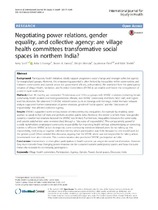Negotiating power relations, gender equality, and collective agency: are village health committees transformative social spaces in northern India?
Date
2017Author
Scott, Kerry
George, Asha S.
Harvey, Steven A.
Mondal, Shinjini
Patel, Gupteswar
Sheikh, Kabir
Metadata
Show full item recordAbstract
BACKGROUND: Participatory health initiatives ideally support progressive social change and stronger collective agency
for marginalized groups. However, this empowering potential is often limited by inequalities within communities and
between communities and outside actors (i.e. government officials, policymakers). We examined how the participatory
initiative of Village Health, Sanitation, and Nutrition Committees (VHSNCs) can enable and hinder the renegotiation of
power in rural north India.
METHODS: Over 18 months, we conducted 74 interviews and 18 focus groups with VHSNC members (including female
community health workers and local government officials), non-VHSNC community members, NGO staff, and higherlevel
functionaries. We observed 54 VHSNC-related events (such as trainings and meetings). Initial thematic network
analysis supported further examination of power relations, gendered “social spaces,” and the “discourses of
responsibility” that affected collective agency.
RESULTS: VHSNCs supported some re-negotiation of intra-community inequalities, for example by enabling some
women to speak in front of men and perform assertive public roles. However, the extent to which these new gender
dynamics transformed relations beyond the VHSNC was limited. Furthermore, inequalities between the community
and outside stakeholders were re-entrenched through a “discourse of responsibility”: The comparatively powerful
outside stakeholders emphasized community responsibility for improving health without acknowledging or correcting
barriers to effective VHSNC action. In response, some community members blamed peers for not taking up this
responsibility, reinforcing a negative collective identity where participation was futile because no one would work for
the greater good. Others resisted this discourse, arguing that the VHSNC alone was not responsible for taking action:
Government must also intervene. This counter-narrative also positioned VHSNC participation as futile.
CONCLUSIONS: Interventions to strengthen participation in health systems can engender social transformation. However
they must consider how changing power relations can be sustained outside participatory spaces, and how discourse
frames the rationale for community participation.

